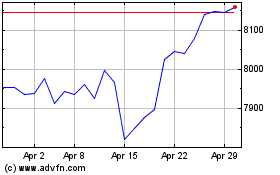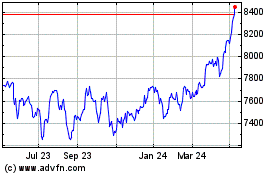U.S. Stocks Rally on Optimism About China-U.S. Trade Talks
17 August 2018 - 2:35AM
Dow Jones News
By Ben St. Clair and Akane Otani
-- U.S. stocks rebound
-- Walmart soars on earnings
-- Emerging-market index nears bear market
U.S. stocks rose Thursday, erasing some of their midweek losses,
as signs that Washington and Beijing have reached a modest
breakthrough in their trade standoff reassured investors.
The Dow Jones Industrial Average rose 349 points, or 1.4%, to
25511. The S&P 500 added 0.9%, and the Nasdaq Composite
advanced 0.9%.
Officials in China and the U.S. signaled Thursday that the two
countries would hold lower-level talks on trade later in August,
something that analysts said helped send both stocks and Treasury
yields higher. The discussions would be the first since May, when
talks fell through and both sides later slapped penalties on tens
of billions of dollars in each other's goods.
Shares of companies that have swung on trade tensions rallied,
with Caterpillar rising 2.4%, Century Aluminum adding 7.2% and
Boeing jumping 3.6%.
Gains in the consumer-staples sector also helped buoy major
indexes, with Walmart soaring 9.4% after it reported sales rising
at the fastest pace in over a decade for the most recent
quarter.
Elsewhere, stocks in Europe clawed back some of their declines
from Wednesday, boosted by gains in the basic resources and
technology sectors. The Stoxx Europe 600 edged up 0.5%.
Major indexes in Asia extended a recent rout, however, with the
Shanghai Composite Index down 0.7% and Hong Kong's Hang Seng 0.8%
lower.
Investor unease continued in emerging markets as declines in
technology companies Tencent and Samsung drove the MSCI Emerging
Markets Index toward bear-market territory, typically defined as a
20% drop from a recent peak. The two companies make up roughly 8.6%
of the index.
A stronger dollar and trade tensions have put pressure on
developing economies in recent months, and Turkey's currency crisis
has added to the strain as investors remained wary of possible
contagion.
When it comes to investing in emerging markets, "the timing is
key," said Laurent Denize, co-chief investment officer of ODDO BHF
Asset Management. "The timing is linked to politics."
In Turkey, investors have been concerned by how politics has
threatened the independence of the country's central bank, and have
driven the Turkish currency lower as a result.
Still, the lira posted gains for its third straight day
Thursday, rising 3.1% against the U.S. dollar. In a show of support
Wednesday, Qatar said it would inject $15 billion into Turkey with
a package that includes direct investments and deposits. Later
Thursday, Finance Minister Berat Albayrak is expected to hold a
conference call with investors.
"The bigger question is whether this is a case of crisis averted
or crisis deferred, and the probability is that it is the latter
given that Turkey's problems remain unresolved," wrote Michael
Hewson, chief market analyst at CMC Markets UK, in a note
Thursday.
Write to Akane Otani at akane.otani@wsj.com
(END) Dow Jones Newswires
August 16, 2018 12:20 ET (16:20 GMT)
Copyright (c) 2018 Dow Jones & Company, Inc.
FTSE 100
Index Chart
From Mar 2024 to Apr 2024

FTSE 100
Index Chart
From Apr 2023 to Apr 2024
